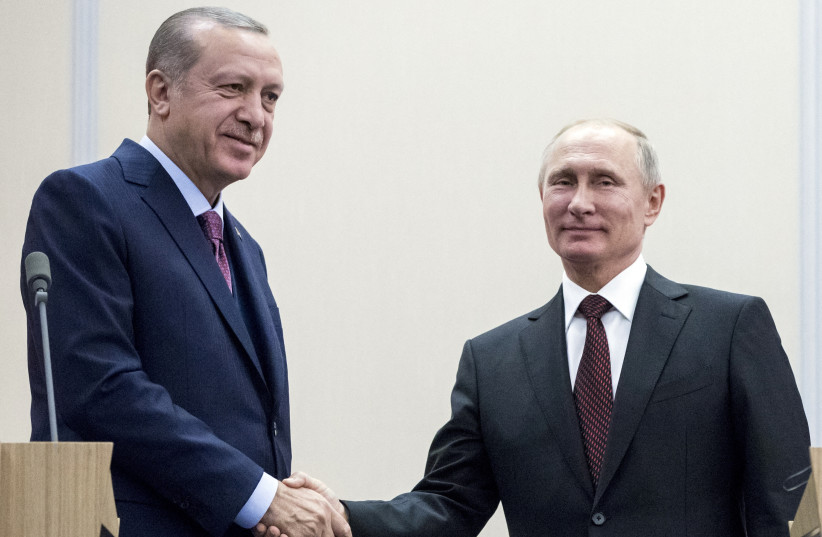Turkish President Recep Tayyip Erdogan is defending Russian interests to ensure his country gets funding ahead of national elections next year, analysts told The Media Line.
For more stories from The Media Line go to themedialine.org
President Erdogan said Thursday he agrees with Russian President Vladimir Putin's claim that grain being shipped from Ukraine after a United Nations-brokered deal signed in Turkey was going to rich countries over poor nations.
The Turkish leader added that he wanted grain exports to start from Russia, which is under heavy sanctions from the West following its invasion of Ukraine in February 2022.
The remarks came a day after comments by President Erdogan on Wednesday, in which he said he didn’t agree with the policies of Western countries.
"I can clearly say that I do not find the attitude of the West (towards Russia) right. Because there is a West that follows a policy based on provocation," he said, according to Turkey’s state news agency.
"I say to those who underestimate Russia, you are doing it wrong. Russia is not a country that can be underestimated.”

“Erdogan is going to the election with… a very tight economic situation and he is looking for outside help.”
Ozgur Unluhisarcikli, director, German Marshall Fund - Ankara office
Ozgur Unluhisarcikli, the Ankara office director of the German Marshall Fund, said it comes down to the Turkish president needing financial investments from Russia.
“Erdogan is going to the election with… a very tight economic situation and he is looking for outside help,” said Ozgur Unluhisarcikli, the Ankara office director of American thinktank The German Marshall Fund.
“He wants to insure the Russian assistance in the elections through the economy.”
He added that the anti-Western tone of Erdogan’s comments could also be popular with voters.
The Turkish president for years has strengthened ties with President Putin and has cultivated a mediator role through which Turkey has maintained relations with both sides since Russia’s full-scale invasion of Ukraine.
Turkish drones have garnered international attention for their success in Ukraine’s fight against Russia.
Turkey faces dire economic crisis
President Erdogan’s spokesman has said Ukraine’s territorial integrity must be protected and that Russia’s demand for the international community to accept its 2014 annexation of Crimea would not happen.
However, Russia has provided Turkey with foreign investment that is badly needed as the country faces economic crisis with massive inflation and rising food prices.
The official inflation rate is reported at more than 81%, but independent economists believe it is even well above that.
Last month, the Russian central bank said it could buy currencies of “friendly countries,” like the embattled Turkish lira, which lost 44% of its value last year.
Last week, Erdogan and Putin talked over the phone about their countries continuing work on a power plant in Turkey, the Turkish presidency said.
Russia is also providing $20 billion for the construction of a power plant in the southern city of Akkuyu.
Erdogan’s popularity has declined amid the struggling economy, while Turkey’s presidential and parliamentary elections are scheduled to take place by June next year.
Polls suggest that Erdogan will face his most difficult contest since coming to power, with several opposition politicians beating him in head-to-head races.
Kerim Has, a Moscow-based political analyst focusing on Russia and Turkey, told The Media Line that Erdogan’s comments came down to the Turkish president wanting to maintain power and attract more money from Russia.
“Erdogan has become the main promoter of Russian arguments in the Ukraine-Russia war in international media,” Has said.
However, Has said that Turkey is becoming more powerful in its relationship with Russia, a change from previous years.
“I think that Erdogan has to shift his position a bit closer to Russia,” Has said. “At least, before the elections.”
Turkey and Russia, on opposite sides of the Black Sea, have historically been rivals and have found themselves on opposing sides in several battlefields beyond Ukraine.
Ankara will be keenly aware of its weakness compared to Russia, which has nuclear weapons and a permanent Security Council seat at the UN.
But the balance of power has seemingly shifted after Russia’s war in Ukraine.
On the sidelines of a trilateral meeting with Iranian President Ebrahim Raisi in Tehran where Syria was discussed, Putin was filmed standing in a room waiting for Erdogan to arrive and greet him.
After the sweeping sanctions from Western countries, Russia may rely on Turkey, which did not impose sanctions, to connect with international markets.
Russian oligarchs have docked their yachts on the popular Turkish coast and both countries have talked about increasing economic trade, a goal of Erdogan’s for months.
“The asymmetric relations in favor of Russia, which has been the norm for many years, is changing in favor of Turkey,” Has said.
